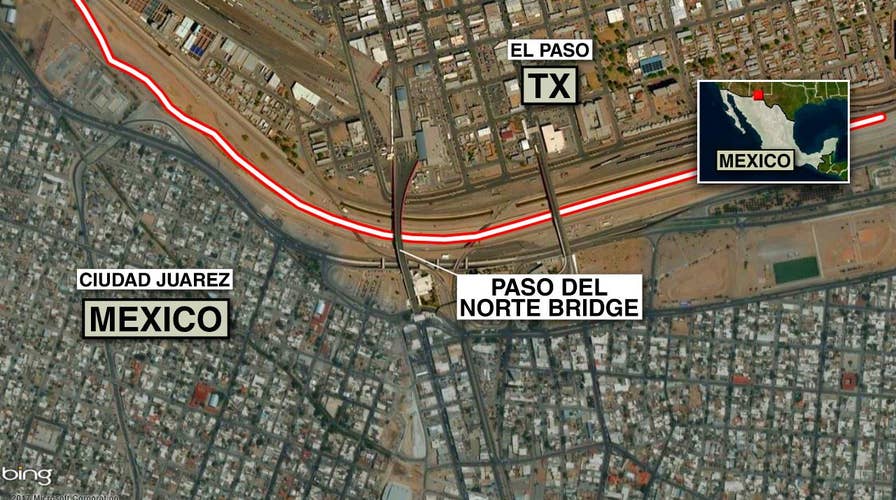Border shooting court case could set legal precedent
A court case regarding a 2010 killing of a Mexican boy by a border patrol agent, could set a new legal precedent, according to a law professor
Can Mexican citizens sue a United States Border Patrol agent for shooting and killing their son standing on the Mexican side of the border?
That’s a question the 5th U.S. Circuit Court of Appeals will have to answer in a case one legal expert believes could set a precedent lower courts will follow for decades.
The en banc rehearing ended Wednesday. If the Hernandez-Guereca family wins they have a right to go through a federal jury trial in El Paso, if they lose they do not have the right to bring a case forward.
The case comes from a 2010 incident when Border Patrol Agent Jesus Mesa Jr., who was standing on American soil, shot and killed 15-year-old Sergio Adrian Hernandez Guereca, who was on the Mexican side of the border. Hernandez, however, briefly had been on the American side before running back across the border to Mexico.
Hernandez’s family argued the group of boys he was with were daring each other to touch the American border fence.
Cell phone video of the incident appears to show the boys run away from the Border Patrol agent seconds after they touched the fence.
The agent takes one boy into custody and the rest run back into Mexico. While the agent appears to be handcuffing the boy he took into custody, he turned around and shot Hernandez. The agent said the boys were throwing rocks at him.
“There’s an anomaly in the law. If that officer would have shot north, east or west as opposed to shooting south, then the victim, a child in the same scenario as we have now, the family would have been able to bring a case,” said Cristobal Galindo, the Hernandez-Guereca family’s attorney.
Attorneys for the family argue that it’s faulty law and they should be able to sue because he was shot by an American law enforcement agent in America.
"We'd like to see it resolved. We're hopeful the court will rule our way and we'll stand by the agent involved," said Stu Harris, spokesman for the El Paso Border Patrol Union.
Steven Mulroy, a law professor and former federal prosecutor, said in addition to setting a precedent, this case also could open up more cases going forward. For instance, if a young boy is killed in Iraq in a U.S. drone strike, can that family sue the U.S. government too?
“If one of them is wrongly killed could they sue the United States government for money damages? That’s the kind of thing we need to be thinking about going forward,” Mulroy said.
But the attorneys for the family said they distinguished their case from a military case. Galindo said they’re specifically asking the judge to make a ruling based on one law enforcement officer against a civilian, and only for incidents directly on the border. Galindo argues any case in federal court can open the door for other cases.
"What they’re looking for is their day in court. They’re looking for their ability to confront the shooter,” Galindo said.
The Supreme Court heard the case, but sent it back down to the lower court in June.
“The facts alleged in the complaint depict a disturbing incident resulting in a heartbreaking loss of life,” the Supreme Court majority wrote. “Whether petitioners may recover damages for that loss of life in this suit depends on questions that are best answered by the Court of Appeals in the first instance.”
Justice Clarence Thomas dissented, and agreed with the lower courts' original ruling that the case against the agent should be dismissed.
Judges aren’t being asked to make a ruling on the incident itself, but on whether the parents can sue for damages as a result of the incident.
According to Mulroy, the judges will consider the Fifth Amendment's due process clause, which protects U.S. citizens abroad and noncitizens in the United States.
“The tricky issue here is that this was somebody who was shot by an agent on the United States side of the border, but was injured on the Mexican side of the border,” Mulroy said.
Mulroy said because the boy was in Mexico, the Supreme Court wants the lower court to consider special factors such as: Is the court intruding on the province of the executive branch? Does the ruling disrupt foreign policy or national security policy? Should Congress weigh in?
In the 1971 Bivens vs. Six Unknown Named Agents case, the Supreme Court ruled a United States citizen could sue for money damages under the constitution. However, because Hernandez was not a U.S. citizen and not on American soil, it’s up for the court to decide if the family can sue for damages.
“The Supreme Court said to the lower court: Why don’t you take a second look at this in light of those factors to decide whether in this kind of a situation somebody would be able to bring a Bivens claim for money damages against the federal government?” said Mulroy.
Mulroy said the court also is being asked to consider the fact that Congress chose to not weigh in on this case. Congress could have passed legislation allowing the family to sue but didn’t, which the Supreme Court said should carry weight in the lower court’s decision, according to Mulroy.
Fox News' Barnini Chakraborty contributed to this story.


